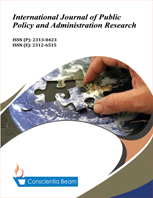Sustainability of Healthy Nutritional Policy Interventions for School Children: A Case Study of Mid-Day Meal Scheme in Odisha, India
DOI:
https://doi.org/10.18488/journal.74.2021.82.53.62Abstract
School feeding programme has remained a prime tool amongst food interventions in addressing hunger and malnutrition of children. The present study examines the nutritional value contributions of the school feeding programme of India namely Mid-Day Meal scheme in Odisha vis-à-vis provides a cost-benefit analysis for restructuring the programme. The nutritional values in terms of total energy, protein, fat, carbohydrate, iron, zinc, calcium and magnesium content were calculated using weekly menu and quantity of food items provided to the school going children. The calculated nutritional values were then compared with the recommended dietary allowances (RDA) provided by Indian Council of Medical Research for children and adolescents. The study finds that with the present menu, Calcium (Ca) and Zinc (Zn) content of the food meets less than 30% of the RDA. Comparatively, the Ca and Zn content is found to be lower on Monday and Thursday when dalma (a local recipe prepared adding vegetables with the pulses) is provided. This is due to the non-availability of guidelines for the preparation of dalma for which schools use pulses and vegetables of their choice and convenience without considering their nutritional potency. The study concludes with the recommendation of restructuring the current menu of using horse gram in place of red gram, and additionally suggests preparing a vegetable curry with the vegetables previously used for making dalma. Moreover, it advocates that the selection of vegetables should be based on their nutrient content.

